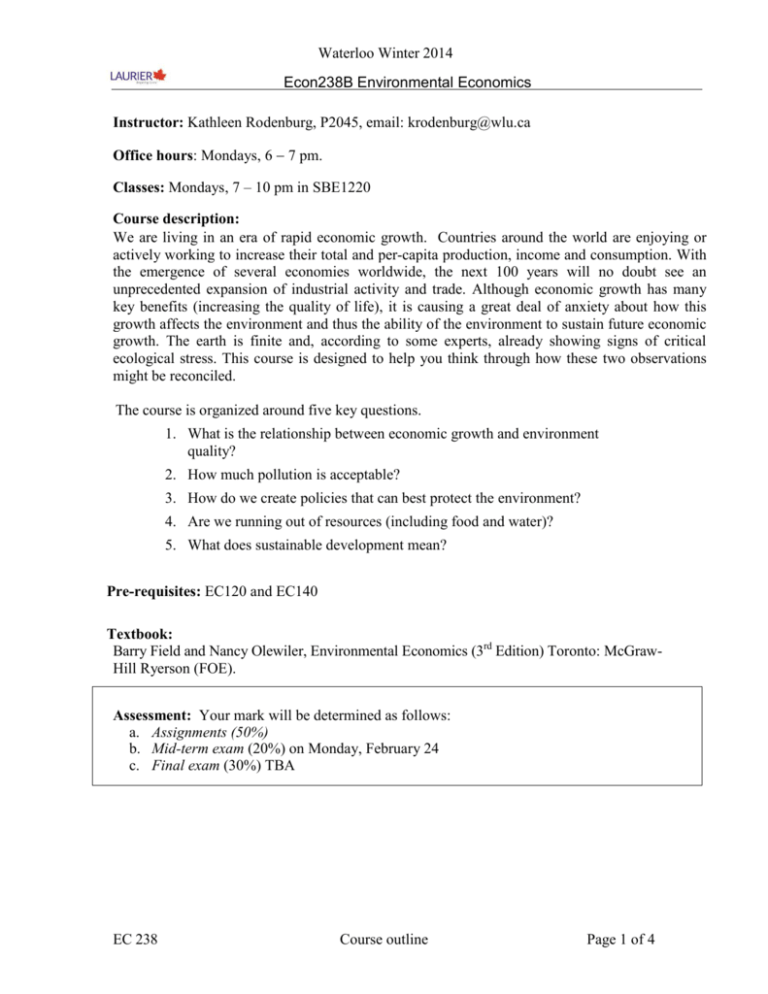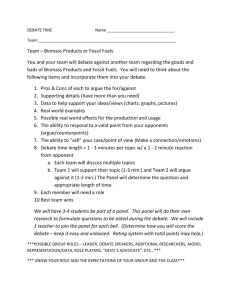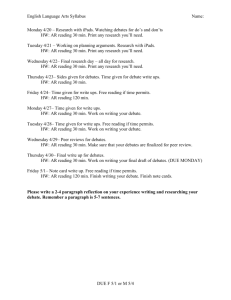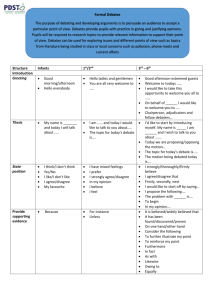Waterloo Winter 2014 EC 238 Course outline Page 1 of 4 Econ238B
advertisement

Waterloo Winter 2014 Econ238B Environmental Economics Instructor: Kathleen Rodenburg, P2045, email: krodenburg@wlu.ca Office hours: Mondays, 6 7 pm. Classes: Mondays, 7 – 10 pm in SBE1220 Course description: We are living in an era of rapid economic growth. Countries around the world are enjoying or actively working to increase their total and per-capita production, income and consumption. With the emergence of several economies worldwide, the next 100 years will no doubt see an unprecedented expansion of industrial activity and trade. Although economic growth has many key benefits (increasing the quality of life), it is causing a great deal of anxiety about how this growth affects the environment and thus the ability of the environment to sustain future economic growth. The earth is finite and, according to some experts, already showing signs of critical ecological stress. This course is designed to help you think through how these two observations might be reconciled. The course is organized around five key questions. 1. What is the relationship between economic growth and environment quality? 2. How much pollution is acceptable? 3. How do we create policies that can best protect the environment? 4. Are we running out of resources (including food and water)? 5. What does sustainable development mean? Pre-requisites: EC120 and EC140 Textbook: Barry Field and Nancy Olewiler, Environmental Economics (3rd Edition) Toronto: McGrawHill Ryerson (FOE). Assessment: Your mark will be determined as follows: a. Assignments (50%) b. Mid-term exam (20%) on Monday, February 24 c. Final exam (30%) TBA EC 238 Course outline Page 1 of 4 Waterloo Winter 2014 Plagiarism: Wilfrid Laurier University uses software that can check for plagiarism. Students may be required to submit their written work in electronic form and have it checked for plagiarism. You are reminded that the University will levy sanctions on students who are found to have committed, or attempted to commit, acts of academic or research misconduct. You are expected to know what constitutes an academic offense, to avoid committing such offenses and to take responsibility for your academic actions. Please consult the Undergraduate Calendar for more information regarding the Universities policy on Academic and Research Misconduct. Accessible Learning: Students with disabilities or special needs are advised to contact Laurier’s Accessible Learning Centre for information regarding its services and resources. Students are encouraged to review the Calendar for information regarding all services available on campus. Laptops, Ipads, Smartphones, Blackberries, etc.: You MAY NOT use these items during class (airplane rules). I request that your electronic devises be powered down during class. I know that some of you may use these devises to take notes during class, however, the temptation to maintain outside classroom conversations and other distractions is great and impedes learning for both yourself and those seated around you. I will ensure that we have technology breaks during the class, so your withdrawal symptoms are minimized. I will post lecture notes, so the amount of note taking required by hand during class is also minimized. Course website: 1. Go to https://mylearningspace.wlu.ca/ and login using your Novell login information. Your MyLearningSpace (hereafter MyLS) home page should appear, along with a list of courses you are registered in. Click on Econ 238B. Make sure you log out after using the MyLS site. 2. If you forget your password, and you have not set up a security question to allow you to reset it yourself, you may visit the ITS Helpdesk in person to have it reset (Please provide photo ID upon your request), or email myls@wlu.ca. 3. If you login and Econ 238B is not listed, check LORIS to confirm the registration status of the course. It will not appear until it is listed in LORIS. EC 238 Course outline Page 2 of 4 Waterloo Winter 2014 Course Schedule FOE-Barry Field and Nancy Olewiler, Environmental Economics (3rd Edition) Week 1. 2. January 6 January 13 Topic 3. January 20 4. January 27 5. February 3 6. 7. 8. February 10 February 17 February 24 9. March 3 10. March 10 11. March 17 12. March 24 13. March 31 EC 238 Introduction Concepts and Overview Economic Growth and the Environment: what the data show Explaining the Data: The PPF Model “The Great Global Warming Swindle” Optimal Pollution: analytical tools; market interpretation; applications Basic Policy Analysis Benefit Cost analysis Legal and Regulatory Instruments “Cool It” Economic Instruments Trends in resources stocks and Food Production Review for Mid-term In-class Mid-term Exam No Lecture The Economics of Sustainable Development A test Case for Biodiversity Debate teams Complete Panel Terms of Reference ‘Mine’ your own Business Rules of engagement for Debate teams. Dates chosen for debate teams Debates/ Panel decisions 8 Teams presenting/judging Canadian Environmental Problems Debates/Panel decisions Environmental Policy in Canada Debates/Panel decisions Global Environmental Problems Recap of debate outcomes (awards presented) Course Summary/ Overview Review for final exam Course outline Requirements/Reading/Assignments Read Chapter 1 & 2 FOE Assignment 1 Due January 13 Re-read Chapters 1 page 15-18 FOE Assignment 2a. Due January 20 Read Chapters 3,4 & 5 FOE Do Practice Problems posted under content tab on the course home page. Debate Teams and topics announced Read Chapters 6-8FOE Do Practice Problems posted under the content tab on the course home page Assignment 2b. Due February 3 Read Chapters 9-11 FOE Do Practice Problems posted under the content tab on the course homepage 2 Hour duration Reading Week Read Chapters 12-14 FOE Panel Terms of reference due March 8 Assignment 3c. due March 10 Audience selects most convincing argument. Read Chapters 15-17 FOE Read Chapters 19-20 FOE Read Chapter 20 Page 3 of 4 Assignments (50%): Winter 2014 Econ 238 1. Environmental Quality and Economic Growth (10%). This assignment will require that you collect historical information regarding environmental quality and the economy with the intention of examining how the quality of the environment changes (or doesn’t change) as the economy grows and contracts. If you do not know how to use a spreadsheet program you probably want to learn. It will make it much easier for you to do the calculations and graphs. It is possible to do them all by hand, but it will take a much longer time than learning a spreadsheet and doing the exercise on a computer. See Assignment 1, under the course content heading on the Econ238 home page 1. Due January 13, 2014. 2. Documentary Critiques (15%). This assignment is comprised of three separate one page critiques on three documentaries covering different topics on environmental issues faced by our society. The one page critique is due the class immediately following the class in which the documentary was viewed. The critique will be centered on exploring a set of key questions provided to you in class the day of the documentary. a. ‘The Great Global Warming Swindle’ –Due January 20, 2014 b. ‘Cool It’-Due February 3, 2014 c. ‘Mine Your Own Business’-Due March 10, 2014 3. Environmental Issues and Policy Great Debates (25%). Each of you will be assigned to a debate team consisting of 5 members. The in-class debates will examine topics from the following three areas: i. Local Environmental Issues ii. Canadian Policy Concerns iii. Global Environmental issues Under-each topic there will be a subset of key questions and issues up for debate. These key questions will be assigned in class. Teams will be asked to take one or the other side of the debate on the key issue (topic) and do research, provide important evidence for their augments in a debate forum. Teams will also be asked to take on the role of panel (or judge) for one session and will be required to make a ruling based on the evidence presented. The audience will also be asked key questions and to submit a ballot. Debates will take place in class, March 10, 17 and 24, 2014. Late Submission Policy: The penalty scheme for late assignments is as follows. The day following is the first day after the due date, the day after that is the second day, etc. The penalty is consists of a factor by which your score on the assignment is multiplied. So if you get 30/40 on the assignment and it is 2 days late, your actual mark is 0.7x30 = 21/40 Days After Due Date Penalty Factor 1st 0.9 2nd 0.7 3rd 0.5 4th and up 0 Due dates are indicated both on-line on the course home page as well as on the course outline. Please be sure that you know when each assignment is due. 1 Assignment created by Dr. Ross Mckitrick, Professor Economics, University of Guelph, Ontario. Winter 2014 Econ 238





